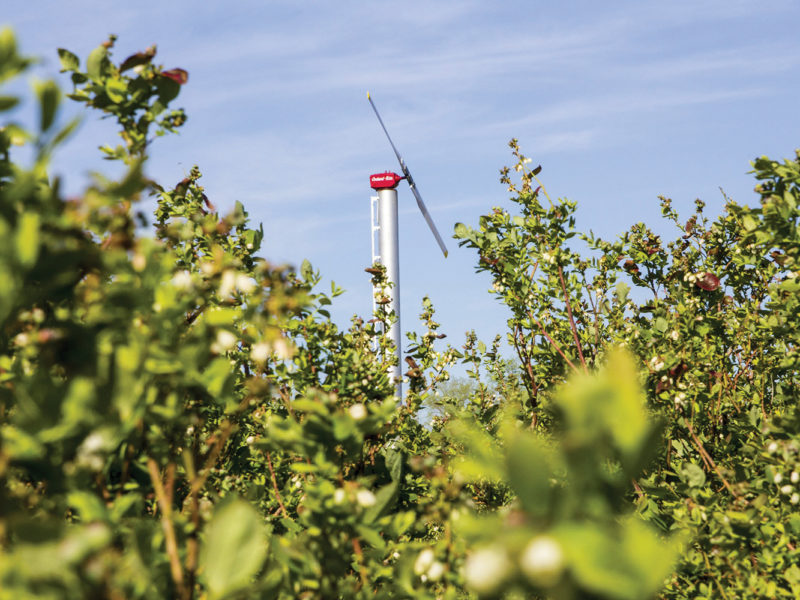SURREY – The BC Farm Industry Review Board received a formal noise complaint on April 20 against a blueberry farm in south Surrey.
According to reports in the Peace Arch News, the couple who initiated the complaint had moved to Morgan Creek from Vancouver in March and were kept awake several nights in a row that same month by what sounded like a helicopter going all night long.
It turns out the noise was coming from two Orchard-Rite wind fans that were being used to protect blueberries from radiant frost damage during a late spring cold snap. When the air cools at night, frost accumulates on plant surfaces causing damage to the delicate buds. If severe enough, it can kill the plants outright.
The owners of the family-run farm were approached for an interview but declined to comment to Country Life in BC about the specifics of the noise complaint because all parties have been advised not to speak to media while the matter is under review.
This part of south Surrey is home to a large number of blueberry farms and it isn’t the first time residents have raised issues with local farming practices. The Morgan Creek Homeowners Association lodged a formal complaint against another blueberry farm in the area in 2000 over the use of propane cannons to protect crops from birds. At the time, FIRB felt that education was a critical component in resolving urban/rural land use issues and identified the importance of education for new homeowners as to what it means to live in an active farming area. The complaint was dismissed.
The area is historically rural and the farm at the centre of the current complaint has been in operation since the early 1980s, long before development of Morgan Creek started in 1994. Other residential subdivisions soon followed.
When temperatures drop below -3°C during budding, the plants are damaged. At best, the yield is reduced. At worst, the farmer can lose an entire field. The wind fans causing the uproar were installed in 2005 for protection against such spring frosts.
Not uncommon
Noise complaints against blueberry farms are not uncommon. Propane cannons received a lot of news coverage over the years and numerous complaints to FIRB, resulting in a 2009 report reviewing the use and regulations of propane cannons in the Lower Mainland.
The difference with wind fans is that they typically operate at night, when sounds are already more apparent in the relative quiet, whereas propane cannons operate between dawn and dusk. Added to that, sound carries further on cold nights when they are more likely to be turned on.
Berries are not the only sector to be targeted by noise complaints related to crop protection. A 2018 FIRB decision regarding a noise complaint against Coral Beach Farms Ltd. from Lavington found that helicopters, frost fans, sprayers and blowers are standard industry practices in the Okanagan valley for drying cherries when rains threaten to split ripe fruit. The board noted, “from time to time, significant noise disruption remains and that this is unavoidable” and advised the farm to implement a series of recommendations to reduce the impact of farm-related noise on neighbours.
Once a notice of complaint has been filed, the resolution process kicks in.
“BCFIRB staff work closely with the parties to try and resolve complaints through a dispute resolution process,” says FIRB executive director Kirsten Pedersen, adding that the complaint proceeds to a formal hearing if dispute resolution doesn’t work out. “Prior to that, parties may work with ministry specialists or others to help resolve the complaint.”
FIRB does not have statistics on how many complaints are dealt with informally and doesn’t track the number of official complaints filed by people who recently moved close to a farm.
BC Ministry of Agriculture, Food and Fisheries berry industry specialist Carolyn Teasdale did contact the berry farm following the initial complaint and suggested the equipment be calibrated to start at -2°C as the type of blueberries grown on site can withstand -3° to -4°C at the pink-tip stage. Previously, the farm had been turning on the machines at 0°C.
The BC Blueberry Council also works closely with municipal bylaw enforcement officers and growers to ensure compliance with normal farm practices.
“In the majority of cases, we find growers are neighbour-conscious and do take the necessary precautions to carry out on-farm activities,” says BCBC executive director Anju Gill.
When it comes to the broader issues that arise when development and farmland have to coexist side by side, she takes a more circumspect approach.
“Perhaps the topic of suburban expectations and farming necessities require an intersectional lens to fully understand the complexity of the issue,” she says.
In the aftermath of the story in the local paper, community support for the blueberry farm was so overwhelmingly positive that it spurred a follow-up article focusing on the clash between urban expectations and rural needs.
Most of the more than 300 comments on the newspaper’s Facebook page and website community backed the farm’s use of the wind machines to protect their crops.


 BC abattoir volume up 30% in 2020
BC abattoir volume up 30% in 2020